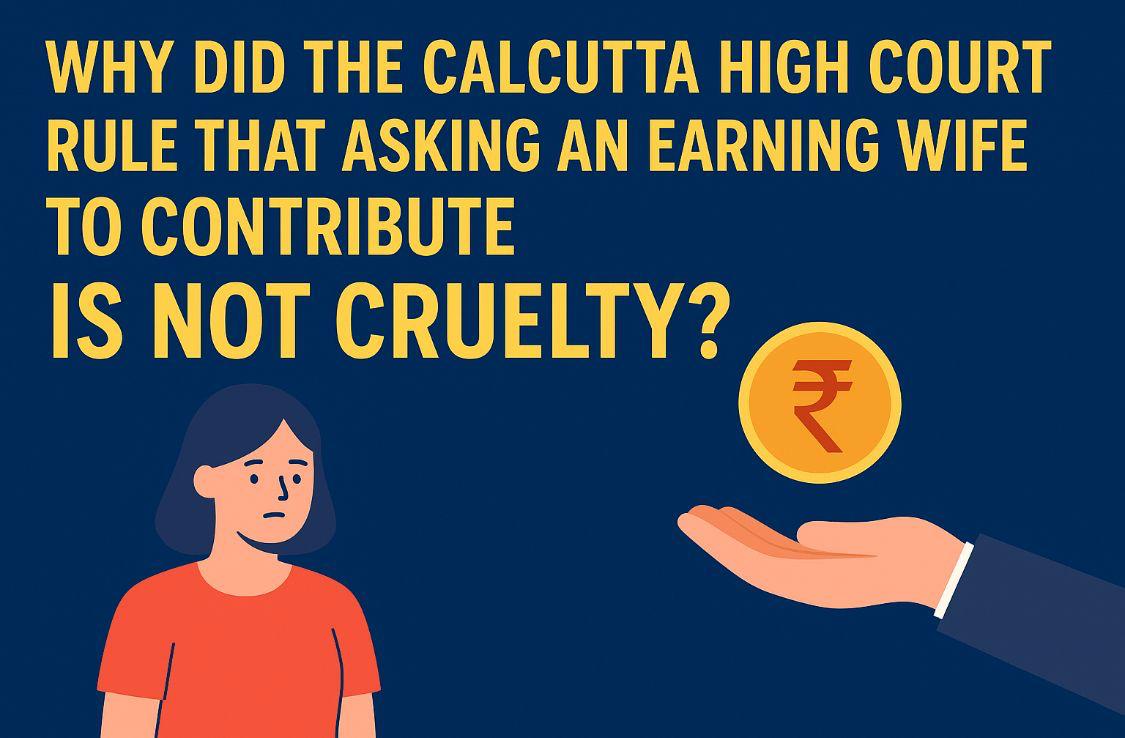Introduction:
Every so often, a court ruling comes along and makes one wonder: Wasn’t this plain logic all along? The Calcutta High Court on 498A case and cruelty definition has quietly triggered exactly that sort of collective sigh of relief among many albeit tinged with frustration that it took this long for sense to prevail. Can asking an educated and earning wife to split a home loan EMI or chip in for the groceries really be called “cruelty”? Justice Ajay Kumar Gupta, in his September 2025 order, didn’t think so. If anything, this judgment feels like a much-needed judicial ‘enough already’ aimed at the weaponization of anti-dowry laws for personal vendettas rather than justice.
Who Wins, Who Loses? The Calcutta High Court on 498A Case and Cruelty Definition Puts Domestic Reality Under the Lens
Let’s pull back the legal curtain. When Dr. Hiralal Konar and his son walked into court, accused of the entire kitchen sink dowry harassment, physical violence, economic neglect, and even violations of the Juvenile Justice and SC/ST Acts you could almost see the fatigue on their faces. The marriage, started in 2014 with the usual promises and punctuated by a child in 2019, had by 2022 soured into a bitter legal quagmire.
What makes the Calcutta High Court on 498A case and cruelty definition so striking is the story within the story: a complaint swelling with allegations but deflated by its absence of detail. No dates. No medical records. No specifics that would make even the most disinterested bystander believe there was something here worth prosecuting for eight years. Most damning was the supposed “caste-based insult” not hurled in public for all to hear, but whispered at home. If every private argument made the charge sheet, Indian prisons would be bursting at the seams.
Let’s Get Real: The Calcutta High Court on 498A Case and Cruelty Definition Slams the Brakes on Bad Arguments
Senior advocate Sekhar Basu didn’t mince words: This was less a legal complaint, more a strategic broadside to settle personal scores. Not that the State rolled over the prosecutor clung to the FIR and testimony, pointing to “cognizable offences” as if the phrase alone could sustain a criminal case without any real fuel. This tension between protecting real victims and shielding the wrongly accused sits at the heart of every 498A case. But here, the Calcutta High Court on 498A case and cruelty definition stomped out the gray zone: general grievances aren’t enough.
What does it even mean for cruelty to include family finances? That’s what the judge wanted to know. Expecting a wife who is well-educated and working to chip in isn’t oppression; it’s life in 2025 for most middle-class urban Indians. Short of demanding dowry or threatening harm, how else are couples supposed to run a home? If this sort of claim had succeeded, what next lawsuits for asking to take the garbage out? Sometimes, it seems, you have to spell out the obvious in black-and-white legalese just to keep the system honest.
The Can of Worms: Calcutta High Court on 498A Case and Cruelty Definition as a Reality Check
Here’s the uncomfortable bit most commentators shy away from: Section 498A is necessary, and it saves lives. But there’s another, darker reality at play when laws with immense power are misused, even occasionally, to settle domestic dust-ups that have nothing to do with real “cruelty.” That’s the message both implicit and explicit in the Calcutta High Court on 498A case and cruelty definition ruling.
Justice Gupta didn’t hesitate. The case, he wrote, brought no specifics, only “general, omnibus allegations.” No evidence of dowry, no proof of caste-based humiliation in public just a lot of noise and heartbreak spread over nearly a decade. Was this, the court wondered, really what Section 498A was invented for? The answer, at least in this case, was an emphatic no.
Conclusion: Justice Served or Justice Warned? Reflecting on Calcutta High Court on 498A Case and Cruelty Definition
By quashing the criminal proceedings, the Calcutta High Court on 498A case and cruelty definition delivers not just a verdict, but a pointed reminder. Abuse of process is itself a form of injustice and the law must serve those who suffer real harm, not those who wield it as a cudgel in ugly personal wars.
But perhaps, in reading this judgment, one shouldn’t get too comfortable. The court’s balancing act is as fraught as any domestic battle. If we want Section 498A to remain a shield for the genuinely oppressed, we must be vigilant against both cynicism and exploitation. Was this ruling overdue? Undoubtedly. Is it sufficient? Only time and a thousand messy, complicated family disputes will say.
Author Information:
By Karthikeyan Ganesan, a law student from KKC College of Law, reporting on law and technology for Nyayasphere. Karthikeyan always likes to stay updated with current trends and important information regarding the law and cases across the country.

